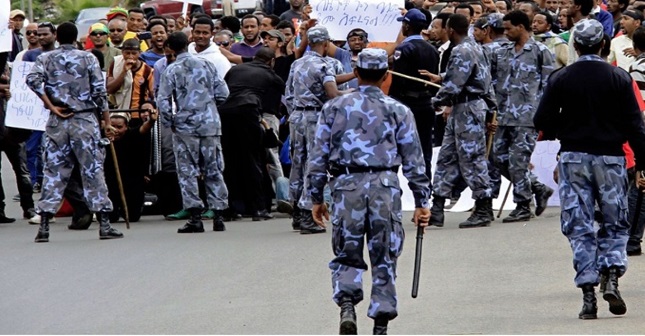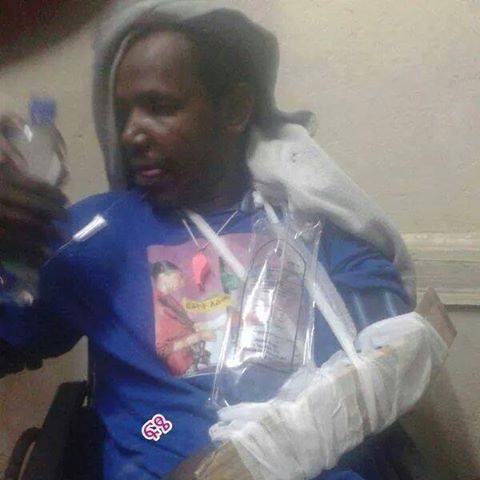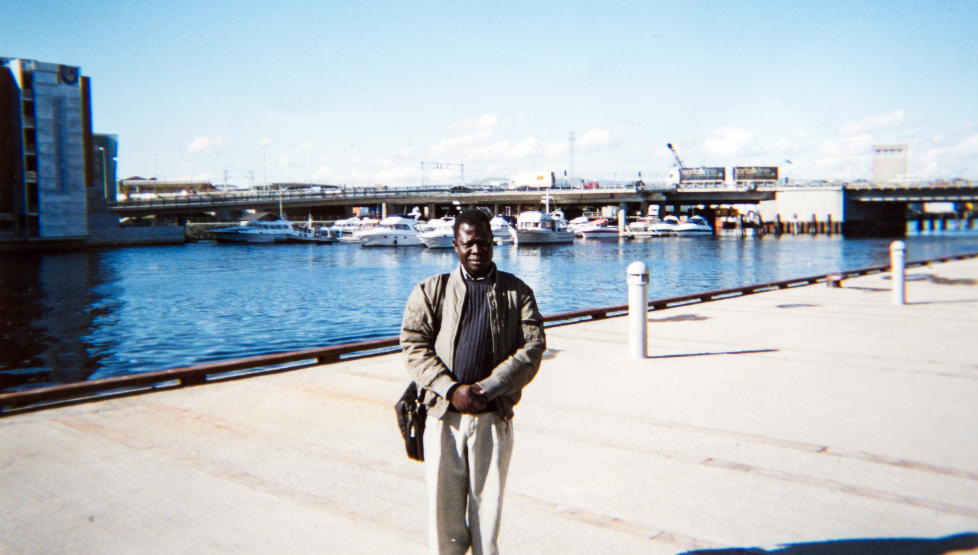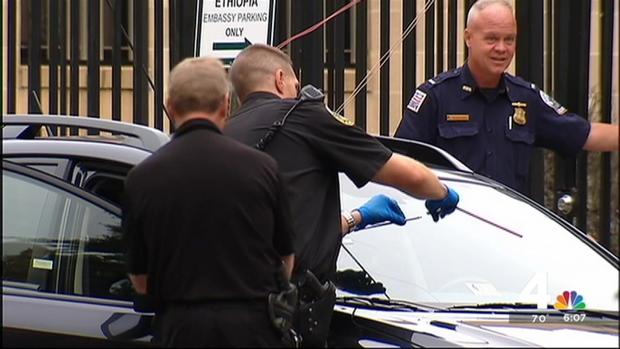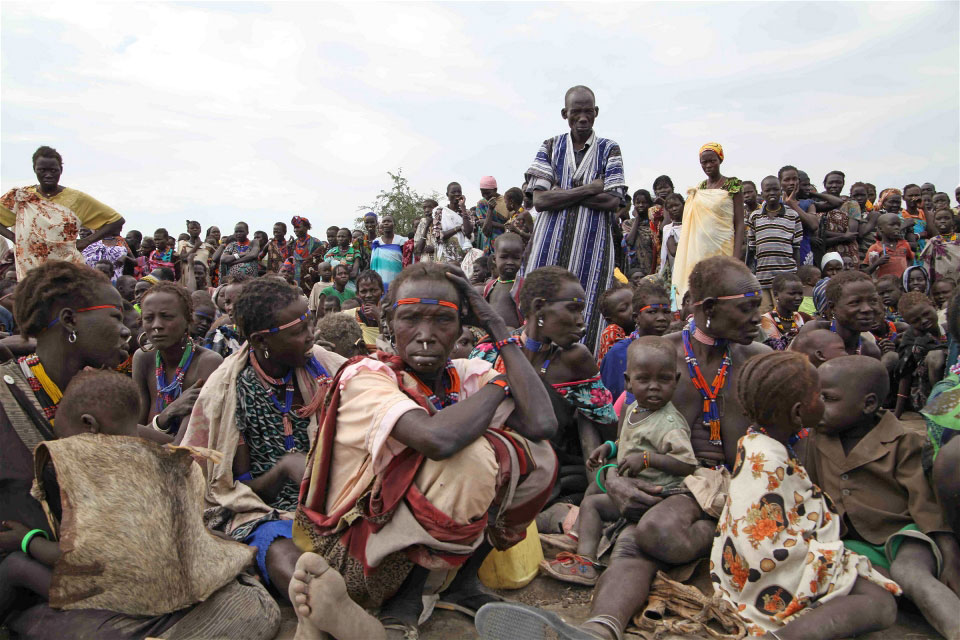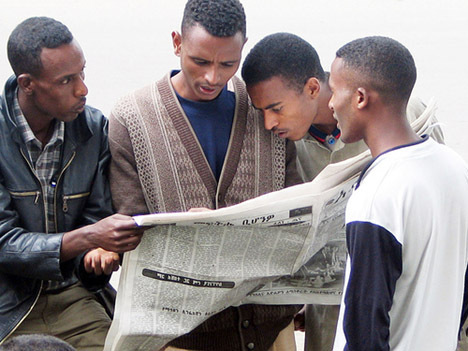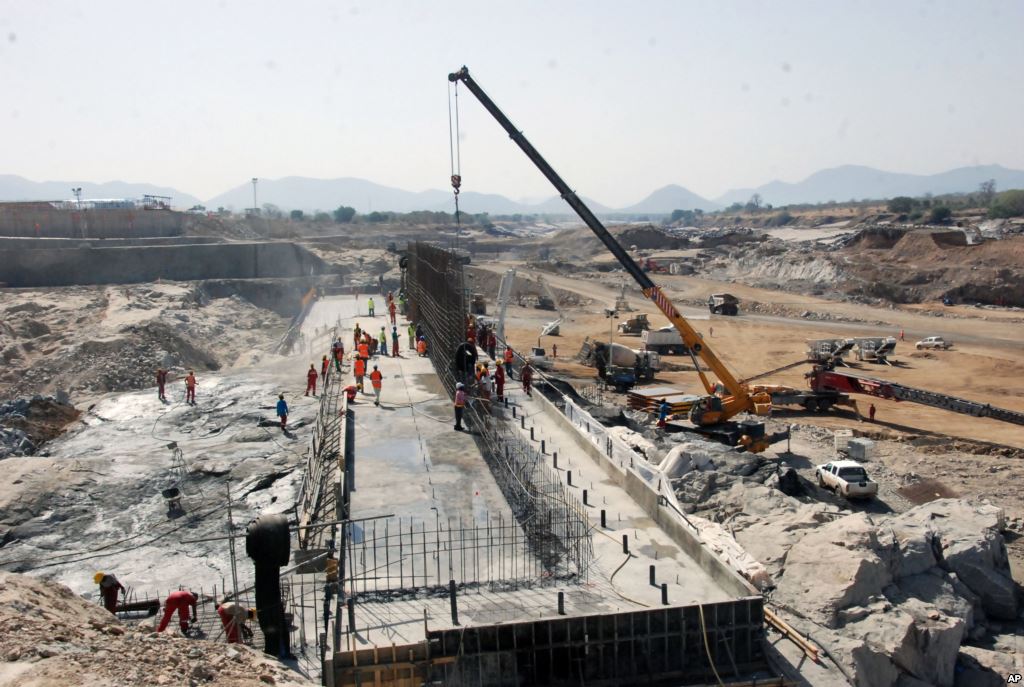
Posts by BetreYacob:
Ethiopia’s Political Turmoil Worsening: Threatening Regional Security
October 18th, 2017By Betre Y. Getahun
Political turmoil, ethnic tension and conflict have continued to engulf east Africa’s most populous nation, Ethiopia. The country is now on brink of an all-out civil war which could affect the whole region.
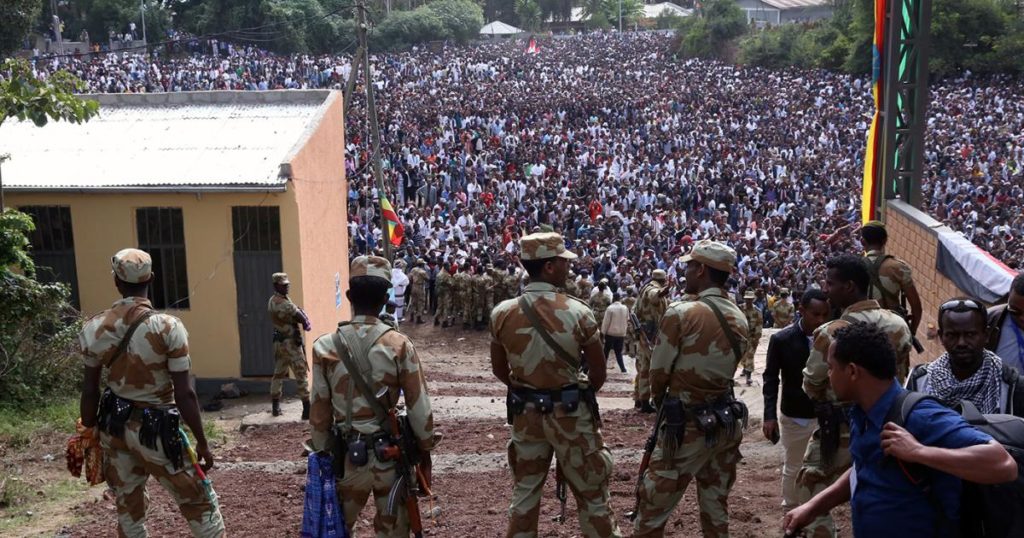
Despite increasing international condemnation, the ruling party in Ethiopia has shown no sign of political reform. Instead, it continues to divide the nation once known for its unity and use all means possible to silence the entire population, estimated to be over 100 million.
According to human right groups’ reports, from 2015 to 2017 only, more than 2000 protesters were killed and thousands were tortured while many were arbitrarily arrested. The 2016 Irreecha festival alone left over 1000 people dead and tens of thousands detained by security forces. And the regime’s killing, torture, arbitrary arrest and brutal measures have continued to intensify as protest and resistance continue to grow.
Until recently, Ethiopia used to be seen as a stable nation in an unstable region. However, the regime’s draconian policies that target particular ethnic groups. discrimination, grand corruption, oppression, and widespread human right violations have led to widespread protest and political unrest, proving that the country is not different from other east African nations known for their decade-long civil wars. This has forced the international community to give at least some attention to the internal dynamics of the political turmoil.
However, the international community has again failed to understand that the instability in this most populous African nation has far-reaching implications and that it is necessary to take action to prevent future disaster.
The recent conflict in the south eastern part of the country in which the regime in Addis Ababa is implicated has shown the international community the true face of the regime and the future disaster it is sowing in this war-torn region of Africa. This conflict has shown us how the unrest has been changing its face over time. It is increasingly clear that the regime’s enforcement of its divisive policies are leading the nation to more trouble.
In this new deadly clashes broke out last month between ethnic Oromos and ethnic Somalis in the country’s dry and mainly pastoralist south-east, hundreds of people are estimated to have been killed. Reports show that tens of thousands have been displaced following the clash. And the conflict has continued to intensify, affecting thousands of women and children.
This and other ongoing political turmoil, ethnic conflict and tension are leading the country to endless and bloody civil war, posing a very serious threat to an already unstable region.
As Addis Standard magazine indicated in its September 2017 analysis large scale conflict is inevitable and an avoidable unless the the government steps down and the ruling party pass power to the people. In this well articulated analyses, the magazine highlighted the fact that the nation is fast descending into horrific turmoil. The magazine reads:
“Popular demands that precipitated a three year-long protest, which started in Oromia in 2014 and then spread to the Amhara and other regions, remain unaddressed. The discontent in the two most populous regional states, Oromia and Amhara, home to two-thirds of the country’s population of over 100 million, is deep and widespread.”
Research findings also show an increase in militant activity across the country. This is one of the basic indicators used to predict large scale conflict or civil war. Margaux Pinaud is a researcher on political violence in Africa. In a recent interview, she stated that the militant activity is high, particularly in regions most affected by the protests, including Oromia, the largest region of the country.
“Activity by ethnic militias in Ethiopia is the highest that it’s been since 1997,” she said. “And activities by political militias — though usually in unidentified armed groups attacking civilians or engaging in clashes with state forces — are also extremely high compared to the rest of the data that we look at,” she added.
East Africa has long been an unstable region known primarily for war and drought. Any civil war that erupts in a country like Ethiopia will have spillover effects and has the potential to expand across the fragile borders of the region. The consequence of such large-scale unrest affects not only the region but the whole world.
Ethiopia shares borders with six countries: South Sudan, Somalia, Sudan, Eritrea, Kenya, and Djibouti. All these nations are in political turmoil and conflict. Somalia, which shares the longest border with Ethiopia has suffered an ongoing civil war since 1988 that claimed the lives of hundreds of thousands of poor Somalis. Both north and South Sudan are not exceptions. It is estimated that the 1983-2002 ethnic war in Sudan had claimed the lives of nearly one million Sudanese; the recent ethnic violence in South Sudan alone has claimed 4,000 lives. The 1998-2000 Ethio-Eritrea devastating border conflict was another tragic war that resulted in a widespread loss of life, as well as injury and damage.
Unbearable Consequences
A civil war in Ethiopia affects the region directly and the consequences are long term and difficult to undo in the future. Such conflict opens doors to terrorists, fanatic armed groups, and ill-intentioned foreign powers. And it makes the region a play-ground for these destructive forces. Some oil-rich Arabian nations have already begun their effort to add fuel to the fire. They are trying to establish military bases in the region and control this strategical geographic area.
As we have seen in the past few years, terrorists are jumping into conflicts and exploiting them to achieve their goal: destruction and mass slaughter. And Africa is no exception. Many African counties are victims of these groups’ new strategies. Boko Haram in Nigeria, Al Shabaab in Somalia, ISIS and Al Qaeda in Libya, Jama’at Nusrat al-Islam wal-Muslimin, the Al-Qaeda linked jihadi faction in Mali are few examples of terrorist groups operating in Africa. And there is no guarantee to say the same thing won’t happen in Ethiopia. As the country is located in a strategic geographic area, the chance to become another Afghanistan and Iraq is high.
The international community and regional institutions have been trying to make east Africa a stable and a safe place. If an all-out ethnic conflict or civil war break out in Ethiopia, this on-going effort would immediately collapse and it would become very difficult to establish law and order in the region in the future. And east Africa would plug into another two or three decades of bloody war and unrest. As this is a drought- prone area, such a conflict would be catastrophic and would result in an even more dramatic humanitarian crisis.
To Turn A Blind Eye Helps No One
Ethiopia is one of the major allies of the west in the fight against terrorism and many argue that this is one of the reasons why the international community is doing almost nothing to force the regime in Ethiopia to make genuine political reform and avert the disaster-in-the-making.
The international community still believes that the government in Addis Ababa is a key partner in improving the deteriorating peace and security in the region. This is a result both of wrong calculations and the shrewd politics of the regime in Ethiopia. The fact is, however, that the government in Addis Ababa is what is turning the nation into lawlessness.
It is a terrible truth that the current stance of the international community is not making Ethiopia safe and the region stable. Instead, it is making the country less stable and increasingly unsafe.
It is obvious that the west is silent not because they do not know what is going on in Ethiopia or because they like the regime. It is because they do not have another option at this point and are waiting for the right time to turn their back on the regime. No one doubts that the US wants to see democracy flourishing in Ethiopia. The question is, when will the US say enough to the regime in Addis Ababa.
The clock is ticking. There is no more time for the international community to sit and watch this large scale conflict in-the-making. It is the time to say enough to the regime in Ethiopia. The security and stability of East Africa is crucial not only to the region but also to the whole world. Therefore, the international community should begin efforts to prevent this crisis from happening.
Comments Off on Ethiopia’s Political Turmoil Worsening: Threatening Regional Security
Ethiopia in the Grip of Drought and Hunger
May 26th, 2016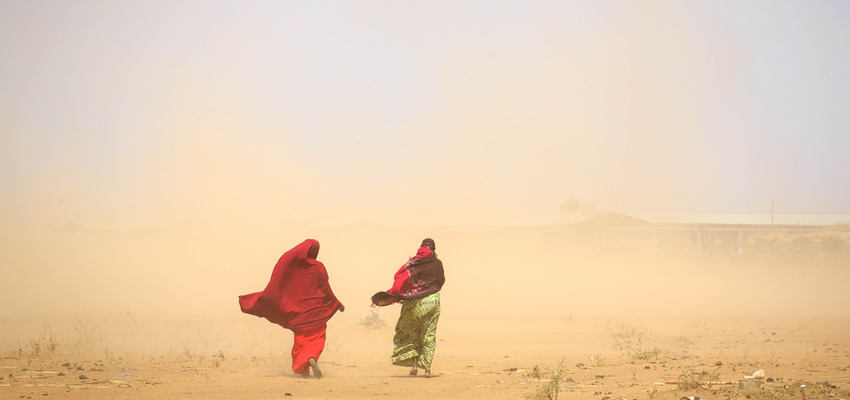
Hassen, a father of 4, lives in a small village located in Halydege (Amibara), Afar region of Ethiopia. The area was one of the few grazing lands in the drought-prone region where raising livestock is a principal source of income and livelihood. The land once covered with vegetation and decorated with twigs and young shoots, however, is now dust bowl and lifeless parched barren land. The water hole that was a source of water both for Hassen’s family and animals is now filed not with water but dust.
“Most of my cows and goats died some months ago because of the drought.” said Hassen. “There was no rain in the area for long time, so there was no browsefor them to feed on. I had several herds of goats a year ago but 8 goats have now left.”
“My entire family is now in a critical situation: I do not have anything to feed them. If the situation continues this way, we are the next to die.” He added.
Ethiopia is once again in the grip of a devastating drought, with millions people in need of emergency food aid and other assistances.Failed seasonal rains have led the country where more than 80 percent of people rely on rain-fed agriculture and livestock to worst humanitarian crises. According to UN, the current drought is the worst in 30 years.
Concerned with the situation, U.N. Secretary-General Ban Ki-moon recently told to the international community that “the scale of emergency is too much for any single government” and needs collective response. Oxfam also warned the international community and said that the situation may become as bad as that of 1984 drought and famine, referring the scale of the drought and the increasing number of affected people.
Triggered by El Niño, the drought has hit most populous areas in the north, east, central and south part of Ethiopia including Oromia and many parts of Somalia. And it has destroyed harvests and killed animals driving millions into hunger across the country.
According to the government of Ethiopia, in severely affected parts of the country, most farmers saw a total failure of their harvests. And there are reports showing that more than 1 million cattle died in pastoralist areas and those cattle left are at grave risk. In some areas, families have reportedly lost over 75% of their animals that are essential for their survival.
Ethiopia has long been wracked by drought and hunger, and the ongoing crisis has resemblance to the last drought in 1984/85. Like this one, the drought and hunger in 1984/85 was the product of climate change. According to reports, the 1984/85 drought and famine was one of the worst catastrophes in modern human history and led hundreds of thousands of poor farmers to death.
Agriculture is by far the most important economic activity in the Ethiopian economy and is a principal source of income for millions. An estimated 80 percent of the population of Ethiopia is engaged in agricultural production.
The agriculture, however, is traditional and fully relay on seasonal rainfalls. More than 95 percent of the farmers don’t have access to irrigation. And, this has made the agriculture vulnerable to low rain and drought caused by climate change, according to experts. Thus, the country has long been dependent on food assistance and foreign aid.
The government of Ethiopia reported that the current drought began in 2014/2015 in the North East of the country. Then, it has continued to cover large areas in north, east, central and other areas. And, according to reports, Afar, Oromia, Tigray, Amhara and Somalia are highly hit regions and the food security of millions of people is affected.
Meher and Bele are the two main rain seasons in Ethiopia. Reports show that the two rain seasons–that supply over 80 per cent of Ethiopia’s agricultural yield and employ 85 per cent of the workforce – have not been successful since 2015.
According to a report recently released by government, in Amhara region alone, it was planned to cover 3,529,155 hectares of land for Meher production in 2015 and 3,509,708 hectares of land was prepared. However, according to the report, almost 1 million hectares of land were totally damaged with an estimated loss of 16,225,263 quintals in 2015 crop season.
Reports show that even in those relatively ‘less affected’ areas, the performance of high yielding crops (maize and sorghum) was reportedly disastrous due to Belg and Meher rain failure. According to reports, production of other crops too was adversely affected throughout the country.
Attributed to the impact of the El Niño episode, failure and poor performance of the 2015 Meher rainfall, together with the last Bele, which was below normal, has led to a drought situation not only in the North, East and Central parts of Ethiopia. This has occurred also in the South, which had never been affected by drought ever before. The Meher rainfall was reportedly very low in amount and extremely erratic throughout the season in the area.
The Ethiopian Government and Humanitarian Partners’ estimate the Number of people needing relief food assistance to be 10.2 millions. Among them 1.4 million are children. UNICEF also reported that one-quarter of all districts in Ethiopia are officially classified as facing a food security and nutrition crisis.
Reports show that there is, however, a significant difference between the demand and supply and it has continued to be a head ache to relief agencies struggling to address the crisis with limited recourses. Local reports indicate millions haven’t got any emergency assistance yet. They are still waiting for it to save their lives.
According to the Ethiopian government and humanitarian agencies, $1.4 billion in humanitarian aid and donations is needed to address the crisis. And the government has continued to plead the international community to give the needed amount of money. The amount raised so far, however, is still insignificant in relation to the need.
This story was first published at http://www.a-id.org A-id is the first Italian think tank that focuses entirely on international development.
Comments Off on Ethiopia in the Grip of Drought and Hunger
Police Brutally Attack Peaceful Protesters in Addis Ababa ahead of National Election
January 27th, 2015By Betre Yacob.
Police brutally attacked and dispersed peaceful demonstrators in the capital Addis Ababa on Sunday as they try to protest against the ongoing government repression on opposition political parties and dissents in run-up to the countries general election..
Political activists say the Sunday’s attack against the peaceful demonstrators is further evidence of the authorities’ determination to clamp down the activities of opposition political parties ahead the election.
In this latest brutal attack against peaceful protesters, dozens of members and supporters of Unity for Democracy and Justice Party (UDJ) were seriously injured. The incident is the most blatant and massive case of lethal police brutality in Ethiopia.
According to reports, demonstrators were brutally beaten with baton, stick and iron rod in the head, face, hands, and legs. One of the victims is said to have been a pregnant woman. Reports show the victims were taken to hospital right away, and some of them are still receiving medical treatment.
Among seriously injured was Sileshi Hagose, the member of the general assembly of the party and editor in chief of a weekly newspaper. Recently released photographs show that he was wounded in the face and head, and his both hands were seriously broken.
UDJ is the main opposition political party struggling in the narrowing political landscape in Ethiopia and is one of the few parties working at national level with an inclusive structure by bringing different ethnic groups all together.
Reports show in the past few weeks the party has been struggling with the National Election Board of Ethiopia (NEBE) over the case of an internal faction that is accusing the party of violating its laws.
The party claims that the faction is consisted of double agents working for the ruling party, and accuses the NEBE of fuelling the problem and using the allegation of the faction as a tactic to tackle the party in favor of the government. And one of the objectives of Sunday’s demonstration was to protest against this what the party calls “government plot.”
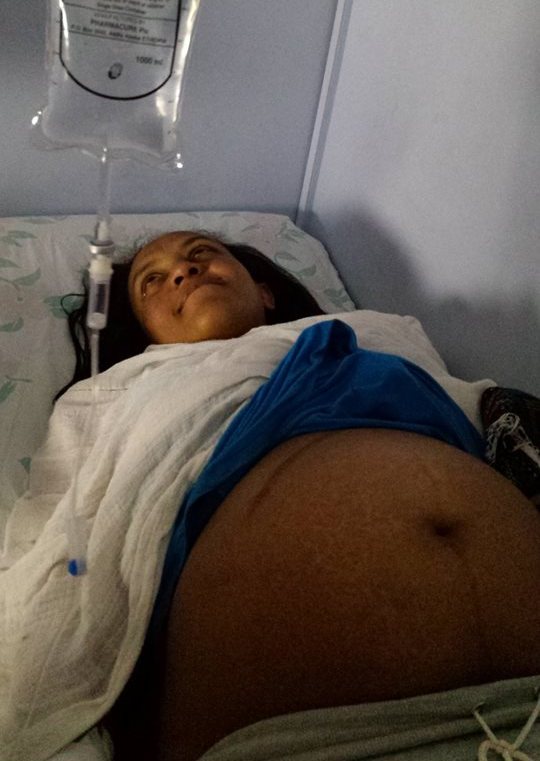 The Sunday’s brutal attack is the latest in a serious of similar measures against peaceful demonstrators in Ethiopia. For instance, on 6 December 2014 several people were beaten during attempts to stage a demonstration called by a coalition of nine opposition political parties.
The Sunday’s brutal attack is the latest in a serious of similar measures against peaceful demonstrators in Ethiopia. For instance, on 6 December 2014 several people were beaten during attempts to stage a demonstration called by a coalition of nine opposition political parties.
Amnesty international reported that the demonstration had been part of a series of activities of nine-party coalition calling for a free and fair election.”
Reports show holding an election rally or demonstration is now totally impossible in Ethiopia as government continue to reject applications for such events and keep its brutal attack against those trying to held.
Escalating Crackdown
According to the National Election Board of Ethiopia (NEBE), the election will be held on May 23 across the country. Yet, as the election approaches, the ruling party is intensifying its crackdown on opposition political parties and dissents.
In 2014 only, several opposition leaders, Journalists, bloggers, and Human Right activists were arrested with numerous publications of the free press closed. More than 30 journalists were also forced to flee the country. The arrest is part of a long trend of arrests and harassment of political opponents, human rights defenders, and journalists.
Activists said at least 12 key and outspoken opposition political leaders, 6 journalists, 6 bloggers, and 2 political activists had been jailed in the capital Addis Ababa only under fabricated terrorism charges.
The ongoing crackdown has included independent civic associations that could play an important role in the upcoming election. Reports shows in 2014 two civic associations were targeted in orchestrated false accusations.
This wide array of measure, which is getting increasingly worrying, is said by oppositions to be calculated to deter challenges and eliminate the scope for the mildest expressions of opposition.
The Ethiopian People Revolutionary Democratic Front (EPRDF) has been on power since 1991, and 4 general elections have been held in the past 23 years. Yet, all those elections were abused, and failed to meet the international standards.
Comments Off on Police Brutally Attack Peaceful Protesters in Addis Ababa ahead of National Election
Family Urges Norway to take action for the release of Okello Ochalla
December 12th, 2014By Betre Yacob.
The family of a Norwegian citizen of Ethiopian origin detained by the Ethiopian Government has urged the Norwegian authorities to exert pressure for his safety and fair trial. Okello Ochalla was seized in South Sudan by South Sudanese security forces and extradited to Ethiopia in March this year. And he was brought to court in June with charges of terrorism offences.
Mr. Ochalla is the former governor of Ethiopia’s Gambella region. He left the country in January 2004 protesting the ongoing human right violation in the region, and became a Norwegian citizen in 2009. Since he left Ethiopia, Mr. Ochalla used to speak against the atrocities committed by the Ethiopian government and was working for justice and human rights of his people.
Now as he is heading to another hearing, his family is concerned: it is not only about his safety but his life. They are afraid that he is being tortured, and could face death penalty. According to Human Right Watch, Ethiopian authorities subject political detainees to torture and other ill-treatment. It also accuse the country of misusing its anti terrorism law to convict oppositions and journalists. The law permits long-term imprisonment and even the death penalty.
In his letter written yesterday to government of Norway, Obok Okello, the son of Mr. Ochalla, says that if the Norwegian government does not intervene and demand respect of international law, it is likely that his father will be convicted and sentenced to death for wanting justice for his people.
“My family is not aware of any efforts being made by the Norwegian government, and as the months pass by, the family is becoming more worried. So we urge that the Norwegian Ministry of Foreign Affairs publicly describe the steps it has taken to ensure they have done everything within their power to demand Mr. Okello Ochalla receive a fair trial and ensure his safety in detention by the Ethiopian Government” Obok Okello explains in his letter.
Obok Okello further pleads the international community to get back his father who is in the hand of the Ethiopian government. “My father is a good man who has always stood by the truth. Please help me in urging the Norwegian Ministry of Foreign Affairs to advocate for his freedom” he pleads.
Reports shows there is widespread human right violation in Gambela Reginal State in the name of villagization program in order to make way for large-scale land deals in the area. And the government has been accused by human right organizations of trying to silence voices coming out of this area and oppositions to its land policy in the regine.
Comments Off on Family Urges Norway to take action for the release of Okello Ochalla
Ethiopian journalist Died in Exile
October 16th, 2014By Betre Yacob.
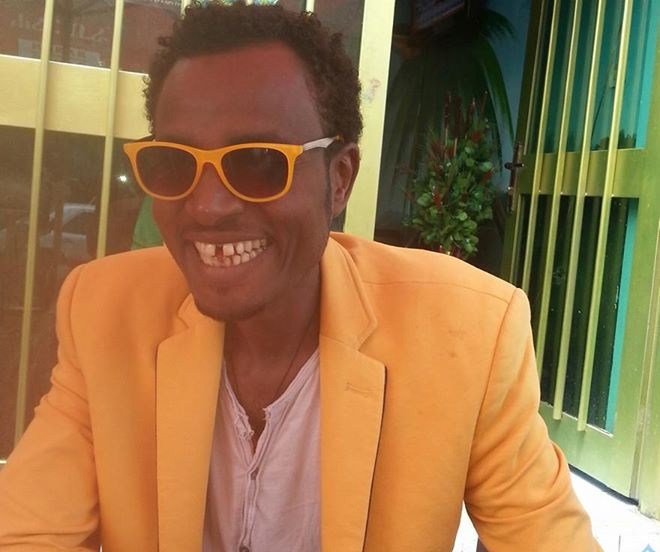 A prominent Ethiopian journalist, Million Shurube, died in Nairobi, Kenya, where he had been in exile since September 2014.
A prominent Ethiopian journalist, Million Shurube, died in Nairobi, Kenya, where he had been in exile since September 2014.
Million, father of a son, passed away on 13, October 2014 at Kenyata hospital at the age of 33. The cause of his death is still unclear.
Million was one of a dozen of Ethiopian journalists forced in to exile recently having been harassed, threatened, accused, and charged with fabricated terrorism offenses. He fled from Ethiopia on September 2014 to escape from imprisonment.
Affectionately known as “Milli”, Million Shurube served as a journalist for more than 10 years. He was the founder and managing editor of a weekly magazine “Maraki”, and had worked for different publications including the now-defunct Abay, Ethiop, and Google newspapers.
Million was also the author of a book discussing the deep rooted social problems in Ethiopia.
Reports indicate that the journalist got sick 20 days after he left his country, and finally died having suffered for more than 15 days. Some says he was told by a doctor to have got Taifoid some weeks ago, and used to receive medical treatment. But, there are also rumors that the cause of his death was not Taifoid.
“Starting from September 24, he was not feeling healthy; he had headache”, his room partner said yesterday in her commentary on his death.
“Recalling memories of his son and his country, he used to cry. So that we would advice him to not be worried too much believing stress was the cause to his headache. But, we later took him to a nearby clinic when we saw no improvement in his health and he was given medication”, she explained.
According to sources, the health of the journalist got much worst over the past weekend. Fallen unconscious he was taken to Kenyata hospital on 11 October midnight and died after two days.
Million was known for his exciting writings on issues including art, religion, and tradition. He was also known for his out spoken and inspiring articles on the political and human right crisis in Ethiopia.
Plight of Ethiopian Journalists
Ethiopia is one of the leading repressive nations in Africa. With at least 17 journalists in jail, the country is now the second leading jailer of journalists and bloggers in the continent.
Despite the growing condemnation from the west, the country has recently continued to intensify its crackdown on the private press aiming to silence independent voices ahead of the 2015 national election. In the past few months only, more than 9 publications have been closed, of them 1 newspaper and 5 magazines were shutdown having faced fabricated accusations and charges.
The country has also sentenced 3 publishers in abstain to more than three years in prison few weeks ago. All of the journalists were convicted on charges of “inciting violent revolts, printing and distributing unfounded rumours, and conspiring to unlawfully abolish the constitutional system of the country.”
In other latest case, the Federal High Court in the capital Addis Ababa also convicted the prominent journalist Temesghen Desalegn. Early this year, a group of vibrant bloggers along with 3 other journalists had been arrested on charges of “terrorism” offenses. A journalist association called Ethiopian Journalists Forum (EJF) was also being accused and later banned, and many of its leaders were eventually forced to flee the country.
As the crackdown continues to intensify, the number of journalists fleeing Ethiopia is rising dramatically. According to recent reports, in recent months only more than 25 journalists and bloggers have fled the country in order to escape from imprisonment. In the face of several challenges, many of them are currently struggling to survive. The death of Million Shurube highlights the plight of these journalists.
Comments Off on Ethiopian journalist Died in Exile
Ethiopian Embassy Staff Fires on Human Right Activists
October 1st, 2014By Betre Yacob
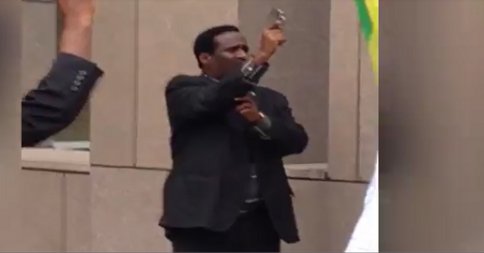 An armed staff of Ethiopian embassy in Washington D.C. fired on human right activists protesting against the deteriorating human right situation of the country within the establishment of the embassy yesterday afternoon. Police reported that nobody had been injured, and it was investigating the case.
An armed staff of Ethiopian embassy in Washington D.C. fired on human right activists protesting against the deteriorating human right situation of the country within the establishment of the embassy yesterday afternoon. Police reported that nobody had been injured, and it was investigating the case.
The fire was first heard at about 12:15 p.m and D.C. police reached at the scene 20 minutes later.
The man allegedly opened fire was detained and questioned by secret service agents and DC police within the compound of the embassy, but he was set free at the end.
A State Department official said the person was set free because he had diplomatic immunity.
Videos taken by the people, who was within the embassy compound, show the activists who suddenly stormed the embassy were peaceful, and were only asking for the release of political prisoners in Ethiopia, and expressing their outrage on the allegedly massacres in the Ogaden and Gambella regions.
The videos show the man brandishing and firing as the protesters were approaching him while asking him to call the Ambassador, Girma Biru. They were seen simply saying “we are not criminals! freedom now! and don’t kill us!.”
Many eyewitnesses say that the gun man was shooting targeting at the people not into the air. Thomas Tesfa, an Ethiopian diaspora in US, is one of such people. He said that the moment was very scary. “The guard attempted to shoot directly at someone towards the end but the gun was either out of bullets or misfires!”, he said.
“He could have killed someone that day especially the last shot he attempted was aimed at someone in front of him. He should be charged with attempted murder.”
Following the shooting, Embassy workers including the man firing locked up the main get of the office and stayed there for more than 20 minutes. In meantime, the activists reportedly took down the current flag of Ethiopia and rose the old one, which is still popular among Ethiopians.
Since recent time, the protest against the regime in Ethiopia has widespread across the world and become much stronger more than ever been. The diasporas in US and Europe are staging continuous demonstration and calling upon the international community to take immediate action. And the Monday’s protest at DC Ethiopian embassy is a part of this global campaign.
The reason behind such protests is the wide spreading human right violations and the deteriorating political crisis in the country. According to human right organizations report, only in the past few months many have been arbitrary killed by the regime’s security bodies either for protesting against the policy and strategy of the regime or demanding government change. And more than 20 journalists and bloggers have reportedly been jailed and tortured just for exercising their rights; and many have been forced to fled the country. Having convicted under the anti terrorism law, countless political leaders are also serving long sentences.
Comments Off on Ethiopian Embassy Staff Fires on Human Right Activists
South Sudan Sets Controversial Restriction on Foreign Experts
September 17th, 2014By Betre Yacob.
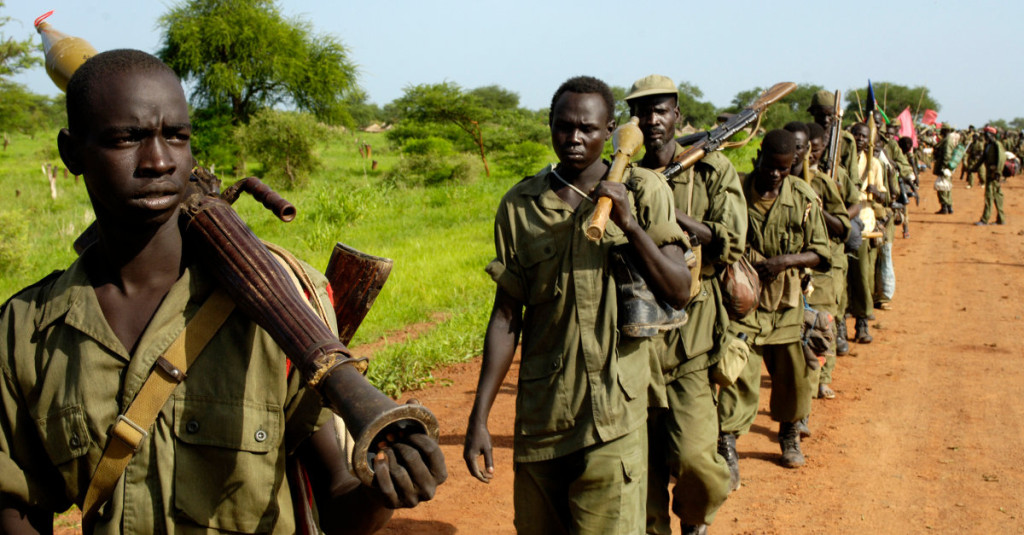 South Sudan has banned foreign experts from employment in the country and orders companies and organizations including aid agencies operating in the country to terminate existing contracts of foreign staffs. The restriction is feared that it would fuel the humanitarian crisis in the country.
South Sudan has banned foreign experts from employment in the country and orders companies and organizations including aid agencies operating in the country to terminate existing contracts of foreign staffs. The restriction is feared that it would fuel the humanitarian crisis in the country.
Reports show that the war-ton South Sudan is currently in the face of much more serious famine, and the situation could become more deadly if the international community don’t act as quickly as possible.
The government, however, says the restriction is set for the benefit of the citizens of South Sudan, and doesn’t pose any threat to the nation. “You need to give employment to the citizens except in those places where there is no capacity,” Foreign Minister Barnaba Marial Benjamin told to Reuters news agency.
“You find in some companies and NGOs it is 100 percent foreign, and that is why the citizens were complaining (about) not being employed when we have the capacity” he explained.
Many agree that the ban is a measure which would worsen and complicate the political and human right crisis in the country ravaged by brutal civil war. It is supposed to massively disrupt the effort not only to control the humanitarian crises but also to bring about peace in the new born nation.
The aid agency Oxfam, which is working in south Sudan, is among humanitarian organizations expressing their concern over the new restriction. Alarmed by the ban, Oxfam has called up on the government of South Sudan to drop the restriction and focus on how to overcome the challenges the nation has faced.
“We need to be expanding aid programmes in South Sudan, not restricting them,” said Tariq Riebl the Humanitarian co-ordinator of Oxfam while speaking to journalists yesterday. “South Sudan is on a knife-edge and could easily tip into famine in 2015. If this order were to come into effect it would disrupts the aid programmes across the country, which feed over one million people.”
Otolo Makur is a journalist in South Sudan and he is among those opposing the new ban. He said the restriction is not something they can simply ignore. “It is what all South Sudanese, who wish peace in their country, and people living in the region should oppose” he said.
Otolo says humanitarian workers are not only managing the aid service but also playing a key role in reporting human right violations and crimes perpetrated in the country to the international community. He believes that to expel these workers will plunge the nation in darkness and allow criminals to do whatever they want.”
The ongoing fierce conflict in south Sudan has breakout on December 15, 2013 and caused the loss of tens of thousands of lives across the country complicating the long standing problem in the region.
According to reports, the fighting has forced more than a million people from their homes, and driven 1.5 million South Sudanese from their homes with almost 5 million left in dire need of humanitarian assistance.
Human Right Watch (HRW) reports that the atrocities in South Sudan amount to war crimes. In its recent report published on August 7, 2014, it says: “Human Rights Watch interviewed more than 400 survivors and witnesses and documented numerous attacks on ethnic Nuer civilians in Juba during the early days of the conflict, including a massacre, unlawful killings, round-ups, detentions, and torture.”
Comments Off on South Sudan Sets Controversial Restriction on Foreign Experts
Independent Publications in the Face of Grave Threat in Ethiopia
May 30th, 2014By Betre Yacob
The Ethiopian authorities are once again moving to pass another legislation which would completely paralyze the last remaining independent publications circulating in the country. The legislation is expected to come into force in the coming year, ahead of the 2007 national election.
The new legislation, which changes the whole existing distribution system of private publications, came following a controversial research report released recently by the government accusing several independent publications of working to incite violence in the country. The research was said to have been intentionally orchestrated to be an excuse for future possible attack.
The free press in Ethiopia has been in great trouble since 2005. The new measure is the latest move by the Ethiopian government to completely control the already engulfed newspapers and magazines operating in the county. According to local reports, together with other restrictive laws in force, the new legislation would lead to total absence of independent press outlet in the country. It is believed by many to be a strategy to silence opposition voices ahead of the 2007 election.
The new legislation, which are currently at draft stage, are, however, said by the government to be intended only to solve what it called “problems in the distribution of the private press outlets.” The government says the existing distribution system is totally controlled and abused by opposition groups, and needs to be changed.
According to the draft law, the distribution of the publications must be done through small business enterprises, which are established under government job creation program. Such enterprises are, however, believed to be established to push government political agenda and interest.
According to journalists and political activists, the law allows the government not only to put pressure on publishers to comply with its own interest but also to hijack publications with unwanted messages during circulation.
The free press in Ethiopia has been struggling between life and death in the past few years. The situation has, however, dramatically deteriorated after the 2005 election, which saw more than 300 unarmed peaceful protestors killed by government security forces. Since then, the Ethiopian People’s Revolutionary Democratic Front (EPRDF), which once had been promising to insure freedom of the press in the country, has taken several measures against the free press. According to different reports, only in the after math of the 2005 election, more than half of the total numbers of the papers, which had been operating in the country during pre election period, were closed.
The Anti terrorism proclamation is the recent legal instruments passed by the regime in Ethiopia aiming to hamper the free press. Adapted in 2009, it has been used to crackdown independent press outlets, journalists, and bloggers deemed by the ruling party to be critical.
Currently, there are very few independent publications left in the country operating under the most repressive media environment. In the face of challenges, they are serving as the only source of independent information to the public. These media outlets are also the only platform for public discourse.
Mass media is highly controlled in Ethiopia. With 90 million population, the country has only one state owned television broadcast network and some radio broadcast stations, which are totally used as a propaganda machine by the regime.
Comments Off on Independent Publications in the Face of Grave Threat in Ethiopia
Independent Magazine in Ethiopia Shut Down
April 7th, 2014By Betre Yacob.
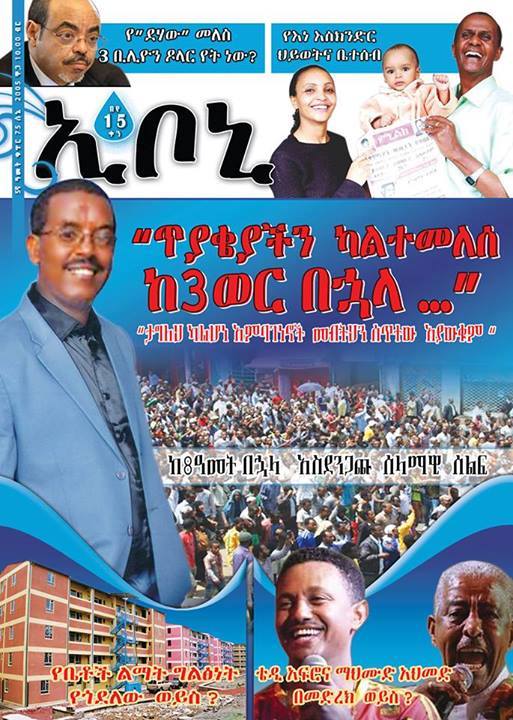 One of the few independent Ethiopian magazines, Ebony, has been shut down after 6 years of publishing, putting many full-time and part-time workers out of a job. Tessema Dessalgn, the shear holder and editor in chief of the magazine, told to journalists today that they had closed the magazine because of exaggerated tax.
One of the few independent Ethiopian magazines, Ebony, has been shut down after 6 years of publishing, putting many full-time and part-time workers out of a job. Tessema Dessalgn, the shear holder and editor in chief of the magazine, told to journalists today that they had closed the magazine because of exaggerated tax.
“We hadn’t other option but to shut down the magazine” Tessema told to journalists. “The tax was so exaggerated, and impossible to us to manage. We didn’t have even the half of the requested amount”, he explained. Tessema said that the tax had come while they had already been in a serious financial fall caused by the alarmingly rising cost of paper and other printing materials.
Ebony was one of the magazines circulated at national level, and known for its political, social, and entertainment stories. It began operating 6 years ago focusing only on entertainment. It exclusively began covering political issues in 2012.
Different reports shows the magazine was targeted by authorities after it began to cover political issues. Frequently, the copies of the magazine were confiscated by the authorities. Moreover, it had faced several challenges from printing companies; they were not voluntary to print the magazine claiming that they had been informed by the regime’s security agents not to print the magazine.
Journalists working for Ebony were also the main target of the authorities. They used to be subjected to harassment, humiliation, and other serious violence as a result of their job. For instance, the former Editor in Chief of the Magazine, Bisrat Woldemichael, was kidnapped and beaten by 4 armed intelligent and security agents on 28 August, 2013.
Exaggerated Tax-The new Strategy
The cost of paper and other printing materials are sky rocket in Ethiopia, dramatically increasing the printing price. Printing companies and publishers blame government for the problem. They claim that the price is artificial, and has been blown up because of the exaggerated tariff the government impose on paper and other printing materials.
The exaggerated printing price is not the only challenge the independent publications are facing in Ethiopia. The government imposes exaggerated tax too on them. For instance, in a recent case, 143,000 ETB was imposed on a local newspaper, Ethio-Mihidar. The amount is equivalent to its annual gross revenue.
The alarmingly increasing printing price and exaggerated tax are seriously smashing the independent private publications in Ethiopia. It is paralysing them causing them to serious economic crisis, and is forcing the weak ones to get out of the market.
Comments Off on Independent Magazine in Ethiopia Shut Down
Ethiopian Journalists Forum (EJF) warns leaders of three Journalists Associations
March 27th, 2014By Betre Yacob.
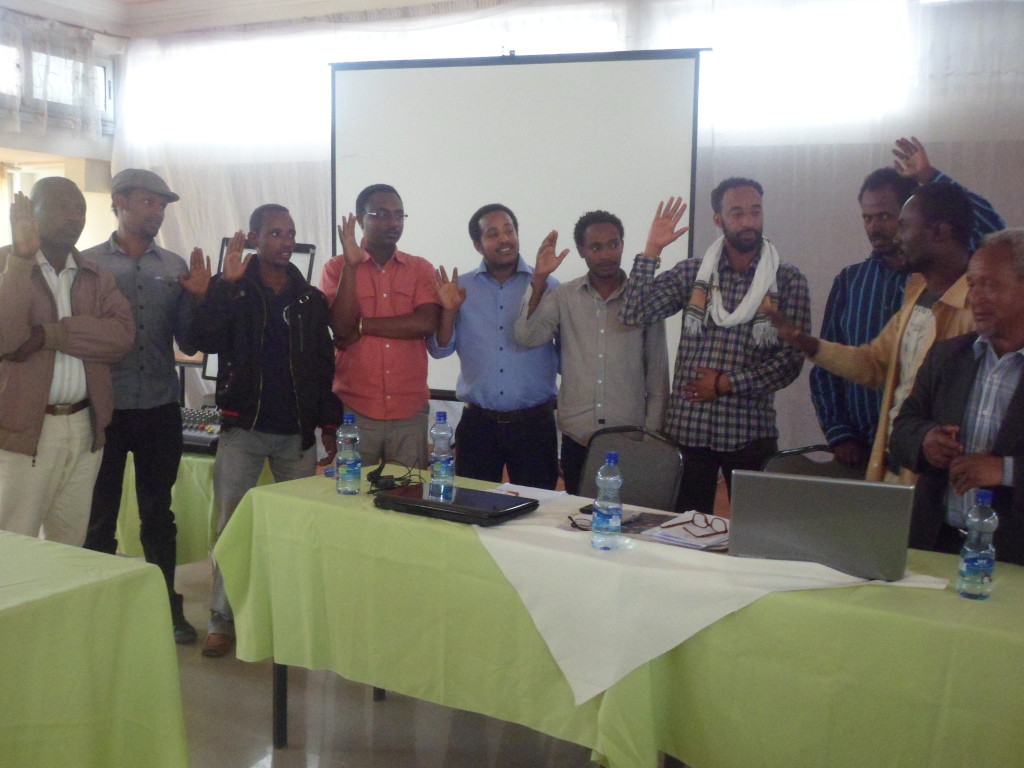 Ethiopian Journalists Forum (EJF), the newly established journalists association in Ethiopia, warned leaders of three journalists associations operating in the country.
Ethiopian Journalists Forum (EJF), the newly established journalists association in Ethiopia, warned leaders of three journalists associations operating in the country.
In a statement issued yesterday, the association accused the officials of Ethiopian journalists Association (EJA), Ethiopian National Journalists Union (ENJU), and Ethiopian Free Journalists Association (EFJA) of fabricating false accusations against the association and members of media organizations.
Ethiopian Journalists Forum is a nonpartisan and independent professional association intended to defend the freedom of speech and of the press in Ethiopia.
The press statement says that the officials have been deliberately engaged in fabricating false accusations ranging from terrorism to conspiracy— aiming to intimidate journalists and members of the association. “They are trying to spoil the name of our association, which is getting a wider acceptance among journalists and media workers”, the statement explains.
“For instance, in an interview published at Addis Admass weekly newspaper issued on March 30, 2014 they said that journalists had been preparing to commit terrorism against the nation and its citizens. They also accused two unnamed countries of backing the journalists. In another article published at Reporter, a weekly newspaper, issued on March 9, 2014 they once again said the same thing accusing journalists”, it further explains.
The statement says the association doesn’t have a response for the groundless accusations of these depraved individuals—who are barking to retain their own cheep benefits. It says it only would like to warn them once and for all to refrain from their unlawful acts.
The EJF was established on 20 January, 2014 considering the harsh working conditions of journalists in Ethiopia; and the importance of a unified media workers and journalists’ voice. In a few months only, the association has been able to get acceptance among journalists and media institutions.
Particularly, the EJF has been welcomed by almost all journalists operating in the free press. Its formation has been good news to those who wish to see an independent institution—which is loyal only to the journalists.
The EJF is supposed by many to be a best framework to work against the deteriorating press freedom in the country and bring about change on the safety of journalists. It is, however, seen as a threat by EJA, ENJU, and EFJA. According to the association, it has begun to experience their accusation since its inception.
The EJF has a vision to become a leading professional association in Ethiopia, which defends the freedom of speech and of the press as well as the rights of journalists.
The Wake of Non-operational Associations
Ethiopian journalists Association (EJA), Ethiopian National Journalists Union (ENJU), and Ethiopian Free Journalists Association (EFJA) were in active for a long period. They came to the stage following the formation of EJF.
Both the associations are accused of being loyal to the regime and of failing to play their role. None of them have ever been seen doing anything to bring about change on the deteriorating press freedom and safety of journalists.
Despite the fact that journalists are still subjected to violence, EJA, ENJU, and EFJA believe freedom of speech and of the press is respected in Ethiopia, and accuse CPJ and other international organizations of defaming the name of the country.
They also accuse Ethiopian journalists of using their rights to incite violence in the country. They even don’t accept the journalists, who are currently behind the bar in the country, are prosecuted because of their job.
Comments Off on Ethiopian Journalists Forum (EJF) warns leaders of three Journalists Associations
Egypt’s New Diplomatic Campaign against Ethiopia
March 17th, 2014
By Betre Yacob.
Egypt has begun a new diplomatic campaign against the multi billion dollar dam Ethiopia is constructing over the blue Nile, as Ethiopians are preparing to celebrate the 3rd year anniversary of the project.
The campaign came after a technical negotiation between the two countries failed early this month.
Citing an unnamed source, Al-Monitor, a popular Egyptian news website reported that the new campaign launched by Cairo aims to convince the international community to exert pressure on Ethiopia to stop the construction of the dam.
“More negotiations with Ethiopia only waste time and directly threaten Egypt’s water security. We realized that Ethiopia doesn’t want any genuine solutions to end the crisis, but is only trying to portray Egypt as approving of the dam’s construction to facilitate access to funding”, the source told Al-Monitor.
According to Al-Monitor, the campaign is led by a team comprised of government officials including water and Irrigation minister, scholars, and public figures. The team has a plan to discuss with all western powers, which are supposed by Cairo to be major players behind the dam.
Ethiopia has begun the construction of the dam, Ethiopian Renaissance Dam, in April 2011. The dam is the biggest in Africa. It is expected to generate 6,000 MW power when it is completed in 2017.
Ethiopia hopes the dam will solve the country’s power shortage and lift its people out of poverty.
According to official reports, 30 percent of the dam has been completed so far.
The relation between Ethiopia and Egypt has been full of tension, mistrust, and anxiety, since the beginning of the construction of the dam.
Egypt sees the dam as a national threat. It seeks Ethiopia to halt the project, claiming it will reduce the amount of water flowing into its territory.
However, Ethiopia has frequently made clear that it will not stop the construction even for a second. It argues that there will not be any harm against Egypt and other riparian countries.
“No Threat”: Independent Panel of Experts
Although Egypt sees the Ethiopian Renaissance Dam as a national threat, independent panel of experts has made clear that the dam will not have any significant harm against Cairo.
The Independent panel of experts was formed in 2012 by Ethiopia, Egypt and Sudan to investigate the dam’s potential risks.
According to the report of the experts, the dam even offers major benefits not only to Ethiopia but also to Egypt increasing the useful lifetime of its dams by reducing silt deposits.
The report also indicates that as the dam is to be built in a deep gorge, the water exposure to sunlight is low, and it also minimizes the amount of water lost in evaporation.
Historical Right and Colonial Agreements
Egyptians believe they do have a historical right to use the water alone. They accuse Ethiopia of violating this right and two treaties made during the colonial period, in 1929 and 1959.
Ethiopia rejects the accusations. It claims that the treaties are not binding because it didn’t sign them.
Laying on the principles of mutual benefits, the country argues that Egypt should amend its zero sum policy and come to cooperation for mutual benefit.
The 1929 and 1959 colonial agreements were made excluding Ethiopia. The first one was signed between Britain and Egypt. And the later was also made incorporating Sudan.
The two agreements have allocated 55.5 billion cube meters of water (or 85% of the Blue Nile water) to Egypt, and 18.5 cubic meters to Sudan.
According to the treaties, the upper stream countries including Ethiopia are prohibited from using the water.
Comments Off on Egypt’s New Diplomatic Campaign against Ethiopia
New Journalist Association Established in Ethiopia
January 31st, 2014By Betre Yacob.

Ethiopian journalists have successfully established a new nation-wide non partisan and independent professional association, which is unique of its kind. The first general assembly meeting of the association was colourfully held yesterday on 30 January 2014 in Addis Ababa.
The new association, Ethiopian Journalists Forum (EJF), is intended to protect and promote Ethiopian journalists and media practitioners, and devoted to promoting the freedom of speech and press freedom.
Ethiopia is one of the lowest-ranking countries in the world with regards to press freedom, and is the highest jailor of journalists.
According to Amnesty International, only during 2011 and 2012, over 100 journalists and political activists were arrested and prosecuted on charges of terrorism and related offenses, for exercising their rights to freedom of expression.
The general assembly meeting of the association was held in the presence of the representatives of Ethiopian Charities and Societies Agency, which has the mandate to give legal certificate to new associations and charity organizations.
Besides the founding members, the meeting was attended by representatives from the US and UK embassies in Addis Ababa.
The half day meeting was concluded electing the official leadership of the association and approving its constitution.
Ethiopian Journalists Forum (EJF) is not the first association to have been established in Ethiopia, but the 9th. There are other 8 journalists’ association operating in the country.
But they all are accused of being loyal to the regime and of failing to play their role. Many journalists claim that none of the associations have done anything to bring about change on the deteriorating press freedom and safety of journalists.
As a result, the EJF has been welcomed by many journalists, who are in dire need of protection. Its formation has been good news to those who wish to see an independent institution, which is loyal only to the journalists and lays its foundation on solid principles.
Many hope that the association is a best framework to work against the deteriorating press freedom in the country and bring about change on the safety of journalists.
The EJF is open to anyone involved in journalistic profession. It registers members under three categories, which are “Ordinary Membership”, “Associate Membership”, and “Honorary Membership.”
Currently, the association has 30 founding members drawn from different media institutions. They work in newspapers, magazines, and in the new media, as reporter, editor, subeditor, columnist, author, contributor, and photographer.
Comments Off on New Journalist Association Established in Ethiopia
The New Born Nation at the Edge of Bloody Civil War
January 17th, 2014By Betre Yacob.
After decades of bloody conflict, the New Born East African Nation, South Sudan, is once more at war. The power struggle between President Salva Kiir and his former deputy Riek Machar has turned the new nation in to a battle field, and is moving its people in to endless bloody civil war that runs along ethnic lines.

The fighting first erupted on December 15, 2013 in Juba, the capital, after what Mr. Kiir described as “an attempted coup” by groups of soldiers loyal to Machar, but quickly spread to other parts of the country. The conflict is now becoming more deadly with increasing involvement of ethnic motivated armed youths.
According to reports coming from Juba, thousands have already been killed in the conflict. There are reports of bodies piled in mass graves, with reports of rapes and arbitrary arrests. The UN mission in the country reported that the killings in some places amount to “war “crimes, with the gravest in Bor, the capital of Jonglei state.
The conflict is more escalating in the north part of the country, which is known for its rich oil reserve. Reports show that forces loyal to Riek Machar are getting stronger, and are advancing to strategic places. Bor is said to have been the first city failing in the hands of rebels.
Only in the past few weeks more than 120,000 people have had to flee the current violence. Reports shows that the number is alarmingly increasing as the conflict spread across the country. There are some 20,000 people seeking refuge in a UN camp in Juba, the capital city. Reports indicate civilians are killed as they try to get out of the flash points.
Reports indicate that the feared “White Army” ethnic militia is fighting hard with the government troops supporting the Riek Machar’s group. And it is feared that such ethnic militia’s participation may lead the conflict in to a full scale civil war.
The Information Minister Michael Makuei told to Reuters that understanding the danger there was an effort by some Nuer tribal elders to persuade the members of the ethnic militia, “White Army”, to stop their fighting. But, according to him, about 5,000 have refused to do so and proceeded with their advance on Bor.
As the conflict escalates into full civil war, the UN Security Council is working to increase the number of its soldiers. It has agreed to double the number of peacekeeping forces from 7,000 to 12,500. Human rights organizations have welcomed the increase in UN troops, hoping that the troops could protect civilians.
Political analysts are warning that the conflict could affect the entire region which lacks stability. They suggest that leaders around the world should push both sides to discuss their differences around table and figure out a solution. Marina Peter, a representative of the Human Rights Organization in Sudan, said, otherwise, “if the war continues, the entire region could very quickly go up in flames.”
Long Rooted Differences
Riek Machar and Mr. Kiir, had long fought for the independence of South Sudan, along with Colonel John Garang, who had been leader of the rebel Sudanese People’s Liberation Army. Garang served his country as a president for 1 year, and died in 2012 in a plane crash.
The relationship between Riek Machar and Mr. Kiir had long been marked by mistrust and disagreement. But, their relation highly deteriorated in the past 5 subsequent months—particularly after Machar was removed from his power (Vice Presidency).
Machar is from the minority Nuer ethnic group, and alleges that Dinka, the largest ethnic group in the country and which Kiir is from, dominates the governing party and the Sudanese People’s Liberation Movement (SPLM). In addition to this criticism, Machar alleges that Kiir has a “soft heart” to Sudan and contradicts the SPLM’s vision. Machar is also known for criticizing Kiir for showing dictatorial behaviours.
Comments Off on The New Born Nation at the Edge of Bloody Civil War
Mass Grave Discovered in Addis Ababa
January 5th, 2014By Betre Yacob
 A mass grave has been discovered in Addis Ababa, the capital of Ethiopia, containing at least 6 bodies of young men, who may have been executed in the past few years.
A mass grave has been discovered in Addis Ababa, the capital of Ethiopia, containing at least 6 bodies of young men, who may have been executed in the past few years.
The identities of the bodies are still remained unclear.
The grave was accidentally found in the area called Ferensay-legasion, inside the barracks of the third army battalion, by road construction workers, who was digging the ground with excavator for road construction.
Witnesses said that the excavator first pulled out two bodies wrapped in blankets and again another four bodies each wrapped in blankets of identical colors. According to witnesses, two of the bodies were still in hand-cuffs and one other had his hands tied behind his back.
So far, authorities have said nothing. But, many are pointing their figures at the EPRDF, the ruling party in Ethiopia.
Witnesses say that the blankets did not lose their original colors and labels and that also indicates the executions were not carried out that long ago.
“It is not doubtful they are victims of the current regime”, a journalist witnessed the event said. “Look! The grave was found in the barracks of the army; on the top of that the blankets didn’t get old; even some of the bodies were in a good condition—they were not totally decomposed.” he explained
Reports indicate that the grave area was immediately fenced off by the army, and the bodies were taken by the federal police.
Ethiopia is one of the nations which are under brutal dictatorial regimes. The ruling party, EPRDF, has frequently been accused by human right organization of mass killings. It is known for arresting, torturing, and killing its opponents.
“It is a grim reminders of the Meles Zenawi era”, A political analyst in Addis Ababa told the Horn Times, East African Website.
“How many more mass graves are we going to uncover in the coming years in this city purged by the regime with unparalleled audacity? It would be the biggest flagrant miscarriage of justice if the ICC chief prosecutor Madam Fatou B let the panicking EPRDF warlords off the hook. It is incumbent up on her to send a team of investigators to Addis Ababa without any delay.
“ This blood curdling discovery has exposed the nation’s festering wounds and further complicated the dreadful ethnic fault line created by the ruling party in May 1991. I personally know that then federal police boss; the snarling evil Workeneh Gebeyhu used the third infantry battalion compound as the headquarters of operations in 2005. He quit the post last year and where is he today? The nation is crying for justice.” he explained.
“EPRDF warlords thought they found a safe spot to store remains of the barbarically executed non-combatant, peaceful protesters. Mass grave right under the nose of the international community and the people of Ethiopia. This crime scene is full of the telltale fingerprints of the dead former ruler Meles Zenawi….” he added.
Imprisoned Ethiopian Journalist Denied a Medical Treatment
December 30th, 2013By Betre Yacob.
 An Ethiopian Journalist Woubshet Taye, who is serving his sentence in Kality Prison in Addis Ababa, is being denied a Medical Treatment. He is suffering from severe renal calculus (kidney stone).
An Ethiopian Journalist Woubshet Taye, who is serving his sentence in Kality Prison in Addis Ababa, is being denied a Medical Treatment. He is suffering from severe renal calculus (kidney stone).
Woubshet Taye is among a number of journalists who have been prosecuted under the anti-terrorism law in Ethiopia. He was imprisoned, and convicted for his work as the deputy editor of the now-defunct weekly newspaper, Awramaba Times.
Woubshet told to journalists, who were visiting the prisoners of conscience in Kality a week ago, that although the doctors in the prison’s clinic told him that his case was severe, he has been given no medical treatment yet.
“They told me that my case required urgent treatment in well equipped hospital, but I have not yet been transferred to such a hospital for unknown reason”, he explained. “They told me that there was nothing to do for me. They are even not voluntary to give me anti pain drugs.” he added.
“I feels sever pain, mostly in the area between my ribs and hip”, Woubshet told to the journalists, adding “It has now begun to prevent me from sleeping.” According to Woubshet, since recent days he has even begun to see blood in his urine.
Sentenced to 14 years imprisonment, Woubshet was transferred to Zeway, a facility far from his family. He first began to feel the symptoms while he was there. He came back to Kality when his health condition got worsened.
Woubshet Taye’s wife, Berhane Tesfaye, fears that Woubshet’s health condition may worsen and cause further deadly complications. “The international community should understand what is going on against him and exert pressure on the government to be responsible and allow him adequate medical treatment” she said.
Woubshet is a father of a son of 3 years old. According to reports, because of his jail, his family is suffering from serious economic problems. Woubshet is the recipient of the “CNN African Journalist of the Year” award.
“Brutal Bribe Seekers”
last week a letter written by Woubshet Taye was smuggled out of the prison and published on a local news paper, Ethio-Mhidar. In the letter, he reveals the presence of corruption in Kality Prison saying that sick prisoners are often asked bribe by the person’s officials to get permission to receive medical treatment out of the prison.
However, the journalist said nothing in the letter whether he is asked a bribe or not.
According to many, denial of providing necessary medical treatment is what the prison administration uses as retaliation against prisoners of conscience and political prisoners.
Brutal African Leaders to ‘Kill Off’ the International Criminal Court (ICC)
December 18th, 2013By Betre Yacob
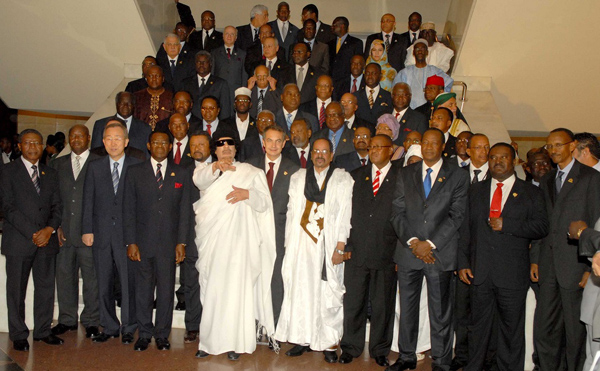 Since the beginning of October, the international criminal court (ICC) based in the Hague has been a very emotionally enthused discussion agenda in Africa. Disappointed with the development made by African leaders to withdraw from the court, millions of Africans have been expressing their concerns over the issue through different media and social networks. They have criticized the Anti ICC campaign, and called on the governments to refrain from taking a shameful action.
Since the beginning of October, the international criminal court (ICC) based in the Hague has been a very emotionally enthused discussion agenda in Africa. Disappointed with the development made by African leaders to withdraw from the court, millions of Africans have been expressing their concerns over the issue through different media and social networks. They have criticized the Anti ICC campaign, and called on the governments to refrain from taking a shameful action.
The worry of Africans regarding the ICC is not surprising, and is understandable. The court matters them very much more than anyone else since it is the only resort to deliver justice for heinous crimes against humanity committed by rootless brutal dictators, who haven’t yet allowed an independent national judicial systems to be established and strengthened. It is the only permanent criminal court with the authority to act when their nation with jurisdiction is unable or unwilling to investigate or prosecute.
The Anti ICC campaign of the African leaders is not a new phenomenon. It dated back to the end of 2007. However, it has been taken seriously by African Union (AU) and leaders of its member states following the arrest warrant issued on the Sudanese leader Omar Hassan Ahmed Bashir, who is accused of crimes against humanity in the Darfur region, and the charges against the Kenyan President Uhuru Kenyatta and Deputy President William Ruto for crimes committed in the ethnic violence that followed a disputed 2007 election. Today, except South Africa, Nigeria, Malawi, and Ghana, all African Union countries have totally refused to cooperate with the court.
The African leaders primarily raise the issue of fairness to condemn the court. They claim that the court intentionally targets Africans. They ask: why almost all of the cases investigated by the court are from Africa? They argued that the court is being used as a political instrument of the west. Surprisingly, they also sometimes try to relate the issue to race and related issues.
However, not only western governments and the court but also Africans do not accept the clams raised by the leaders, who live through the barrel of their gun. They argue that most of the cases are originated from Africa because Africa is a place where brutal dictators do atrocities in order to keep their power. They claim that there has never been a person accused and convicted for doing nothing but also grave crimes. They raise a critical question to AU: Was the conviction of Charles Tailer wrong? Which cases have been wrong?
Luke Tembo is a spokesman and advocacy expert for the Center for Human Rights and Rehabilitation in Lilongwe, Malawi. He rejects the criticism of the leaders that the ICC targets Africa. He said in an interview with a journalist: “Yeah, that has been the argument. But if you look at the issue of African leaders – if you focus on the rule of law on most of the African leaders – you find that they fall short of adhering to the principles of criminal justice. Those who are saying that they focus much on Africa it’s because you will find that leaders in Africa actually perpetrate violence and abuses.”
Likewise, in an online petition titled “Who will stop the next genocide?”, the 82-year-old anti-apartheid hero and Nobel peace laureate Desmond Tutu said the claim of African leaders is groundless. Supporting the presence of the court and condemning the move made by African leaders, Tutu said “the ICC has been the world’s first and only court to try crimes against humanity”, adding “who have inflicted terror and fear across their countries of trying to drag Africa out of the ICC, allowing them the freedom to kill, rape, and inspire hatred without consequences.”
Different groups warn that if African nations withdraw from the ICC, then there will be grave violations and abuses of human rights with impunity. They are suggesting that Africans should get together and stand against the move. According to reports, in the online petition titled “Who will stop the next genocide?”, ten millions of African have put their signatures demanding protection for the court.
Even if they don’t get acceptance and the pressure against them is getting stronger, African leaders has, however, kept going forward to throw the ICC out from Africa. In a special summit held on 11 October, they made clear to the world that African leaders would no longer be investigated and convicted by the ICC. In their statement, they called up on the court to drop the charges against Omar Hassan Ahmed Bashir, Uhuru Kenyatta, and William Ruto.
The ICC was created by the Rome Statute which came into force on 1 July 2002, having the objective to prosecute individuals for genocide, crimes against humanity, war crimes, and the crime of aggression. Currently, 34 African countriesare states parties to the Statute of the Court. Botswana, Cote d’Ivoire, Guinea, Lesotho. Liberia, South Africa, Nigeria, Senegal, Sierra leone and South Africa had played a crucial role in the early establishment of the court, and some of them have yet actively supported the court.
According to the data obtained from the ICC, from the overall, 97% of cases investigated and prosecuted by the court were from Africa. Currently, eight of the cases under investigation are originated from the same region.
Source: http://www.assaman.info/
A Shocking Tragedy Behind Human Trafficking in Ethiopia: One Woman’s Horrific Story
December 9th, 2013
By Betre Yacob.

Metema-Galabat, a ‘desert rout’ of human trafficking from Ethiopia to Sudan, is a place of suffering for many Ethiopian girls. Physical and emotional abuse, including rape, torture, starvation, imprisonment, threats, beatings, and even death are just some of the horrors the majority of trafficked girls face while passing through this rout. This is why many compare the rout to that of the North Africa’s ‘deadly tunnel’—Sinai desert.
Workie Endalkachew is one of many Ethiopian girls who have experienced such serious human right violations and suffering during a journey through this dodgy root to Khartoum, the capital of Sudan— the oil producing country. She was found unconscious on 25 September, 2013 by the Sudan border guards in the desert located in eastern part of the country, and fortunately escaped from the teeth of death.
As it is known victims of human trafficking, particularly those who are raped and sexually assaulted are often unwilling to tell their horrific experience because of the shame. However, motivated by a courageous desire to expose the horrific feature of human trafficking, Workie told to me her experience one by one.
Dreaming a Better Future
Workie was a student when she was recruited and prepared for the journey. She was convinced by a local broker who promised her an employment and a better life in Sudan. She was trafficked together with her school friends by well organized traffickers who have a connection with Ethiopian local authorities.
“When I left my village, I was confident I would reach Khartoum safe and find a very good job”, Workie narrates her story. “I was thinking just how hard I would work and help my poor parents who were in problem to cover their basic expenses. I was dreaming about the successful and joyful life I expected in my new country.”
Workie says that her parents too were very happy when she left her village. She says that they were sure that she would reach Sudan, find a good job, and change their hand to mouth life. “No one expected something bad might happen”, she noted.
“Odd and Tail Come After”
Workie says the trip was as peaceful as she had expected until they reached the Ethio-Sudan border. “When we arrived at the border— it was midnight”, Workie says. “There, we were taken by 5 Sudanese to an underground house far away from the main road. We walked for more than 30 minutes to reach there.”
There, at the middle of the night, Workie was violently raped by 2 traffickers. “They said ‘take off your coloth!”, she says as tears ran down her cheeks. “I said ‘No – so they beat me up severely and forced me to have sex with them.”
By the next evening, the deadly journey, which crosses the burning Metema-Galabat desert, began on foot-using the moon light. “I was not ready for the trip” she says. “I was feeling pain all over my body. But, I had no choice but to accompany them.” Workie says that the desert was more than challenging. “It was a hell: besides its testing heat, it was covered with small shrubs which have nasty thorns. Except dangerous snacks- no life was there”, she explains.
On the second day of the trip, Workie took her second brutal beating for refusing to have sex. “Although I begged him not to do that—he didn’t accept me”, she says. “I tried to run away, but he easily cached me and beat me up and…”, she explains.
On the same day, 4 other girls were raped, and one girl [she was the very youngest in the group] was also brutally killed to have been stabbed with a knife for refusing what the traffickers asked her to do. “It is really dis-speakable”, Workie explains. “They didn’t have the human sense like us”, she noted. Workie says that the girl was killed after being raped.
Desperate and frightened, Workie now decided to come back home. But, when she later thought how far away she came across the desert, she regretted and began to pray. “I was so late to take any action except to pray”, she says.
On the following day, all the girls were sick and weak; and their feet were seriously scratched and wounded. Despite the hunger, they were extremely dehydrated. It had been more than 24 hours since they saw water. But, even in this life threatening condition, they experienced the same problem they had experienced the day before. 3 girls were brutally raped.
The next day was the worst of the worst. Three girls [Two of them were those who had been brutally raped a day before] left behind in the heart of the burning desert to have been unable to keep the journey. “I didn’t try to help them”, Workie says. “I was almost the same to them. I was very weak; I was walking wildly and desperately”, she explains.
Workie says that some of the girls, who had relatively better physical strength, were as to help the girls, but the traffickers prevented them from doing so claiming that such acts would slow the journey.
In this way, after 5 day’s deadly journey, the girls arrived at a place where one of the traffickers received a phone call. “I don’t know what the caller was telling to him, but he was so scared”, Workie explains.
After the conversation done in Arabic, the traffickers threatened the girls and begun to collect their pocket money, mobile phone, and other properties. “When he asked me: give me the money in your pocket? I said no.” workie says. “So he beat me on my face with iron pipe and dragged me away. I don’t know what then happened. When I opened my eyes I found myself in a hospital taking a medical treatment. And the doctor told me that I was even stapped with knife”, she explains.
Workie says that the traffickers had food and water. “In every stop, they would eat and drink, and then rap us”, Workie says. “Noon of them was voluntarily to give us water or food, even to those raped and seriously injured”, she explains.
According to Workie each night they travelled around 35 Km. She says that they had sometimes to run. According to her they used to travel only by night, using the moonlight, not to be seen by Sudan border guards. “We used to spend the day hiding in selected places-usually under caves and shrubs”, she says.
Human Trafficking in Ethiopia
Human trafficking is an immense problem in Ethiopia. As a result of rampant poverty, large numbers of Ethiopian girls are voluntarily trafficked to Sudan, through illegal ‘desert routes. They are mainly trafficked for household labor purposes including cleaning rooms and compounds, washing, cooking, disposing waste, and looking after children and elders.
The challenge the girls face during the journey is not the end but the beginning of the trauma. Even in the case they succeed to reach Sudan and get a job, they are subjected to abuses such as long working hours, unbearable workload, restricted movement and isolation, inability to change employers, lack of leisure, denial of wages, and irregular payment of wages.
Who are the Traffickers ?
Trafficking in persons is extremely lucrative in Ethiopia. As indicated by Africa Plus News (2011), traffickers who prey on girls in Ethiopia expect to earn around seven thousand Ethiopian Birr (More than US $800) for each person they send.
Many think that these traffickers are ordinary people or that they are doing the business because of poverty. The truth is, however, that these people are economically rich and are those who are not commonly expected to be trafficker. According to a research conducted by Bahir Dar University, most of them are known in the community positively, and do have their own legal business in big cities of the country. In addition, the study shows that most of them run the trafficking business together with border police, border guards, and other responsible government officials.
Source: http://www.assaman.info/
Three Ethiopian Journalists Injured in Car Accident
November 3rd, 2013By Betre Yacob

Three Ethiopian journalists working for an independent Newspaper, Ethio-Mihdar, experienced a vehicle accident on Wednesday, October 30, in Hawassa, a town in the southern part of Ethiopia. The accident left Ephram Beyene, the Editor of the newspaper, with severe injury on his spinal cord, and two others with minor physical injuries.
According to reports, the accident was caused by a motorcycle that hit the three legs vehicle (Bajaj), the journalists were travelling in.
Getachew Worku, editor-in-chief, Million Degnew, general manager, and Ephram Beyene, were in Hawassa because of an accusation made by a local university in connection with a reporting on corruption case.
“Though the correction was made in relation to that particular news, the University sued and we went to Hawassa in order to defend our newspaper and ourselves,” Getachew told to journalists. The University sued the newspaper, claiming 300,000 birr in damages.
According to reports, when the accident happened, the journalists were going to a place called “Piassa” to meet their local correspondent.
Many say that the accident might have been orchestrated by the university officials. Reports indicate that before the vehicles collided, both the drivers had jumped down, and no one still knows their where about.
Ephram Beyene is now in intensive care in a Korean hospital in Addis Ababa. He underwent surgery on his spinal cord twice in the past days.
International Commission of Jurists (ICJ): Ethiopian Leaders to Face a Trial for Genocide
October 30th, 2013By Betre Yacob.
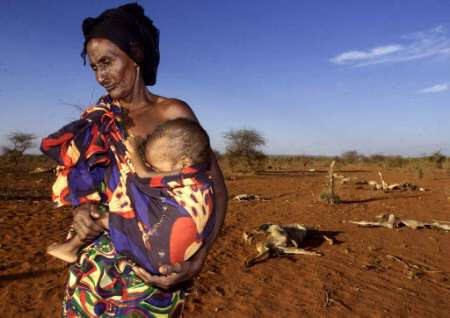 The International Commission of Jurists (ICJ) reported to have begun to work to bring Ethiopian authorities to justice for having committed a genocide in the Ogaden region. The International Commission of Jurists is a known international human rights organization composed of jurists (including senior judges, attorneys, and lawyers). The commission is known for its dedication to ensuring respect for international human rights standards through the law.
The International Commission of Jurists (ICJ) reported to have begun to work to bring Ethiopian authorities to justice for having committed a genocide in the Ogaden region. The International Commission of Jurists is a known international human rights organization composed of jurists (including senior judges, attorneys, and lawyers). The commission is known for its dedication to ensuring respect for international human rights standards through the law.
The report came right after different Swedish TV channels showed a movie smuggled out from Ogaden by an Ethiopian refugee, who had been a government official in the region. The 100 hours long movie is said to have many evidences of genocide committed by the Ethiopian government in the region.
Speaking to journalists, Stellan Diaphragm, the commissioner of the Commission, said that he would do everything necessary to bring the case to the International Criminal Court (ICC).
Reports indicate that although Ethiopia is not a member of the ICC, the country can possibly face trial for crimes under international law.
The Ogaden region is a territory in Eastern part of Ethiopia, and populated mainly by ethnic Somalis. Since 2007, the region has been a site of brutal struggle between the government troops and the Ogaden National Liberation Front (ONLF), a rebel group seeking for more autonomy for the region.
Different human right organizations accuse the Ethiopian government of committing grave human right violation (including genocide) against the civilians in attempt to control the ONLF’s public support.
According to the Genocide Wach, the crimes committed in the region include extrajudicial killings, arbitrary detention, rape, torture, disappearances, the destruction of livelihood, the burning of villages and the destroying of life stock.
A Journalist kidnapped, Threatened, and Beaten by Intelligence and Security Agents in Ethiopia
September 23rd, 2013By Betre Yacob.
 The Ethiopian journalist Bisrat Woldemichael was kidnapped, threatened, humiliated, and beaten by the Ethiopian intelligence and security agents on 28 August, 2013. He has reported this incident today to journalists.
The Ethiopian journalist Bisrat Woldemichael was kidnapped, threatened, humiliated, and beaten by the Ethiopian intelligence and security agents on 28 August, 2013. He has reported this incident today to journalists.
Bisrat reported that the dreadful incident took place at Gotera, a place in the capital Addis Ababa as he was walking home from work. He said he was victimized for exercising his right to free expression in conjunction with the related right to press freedom.
Bisrat Woldemichael works for a magazine, Ebony, as Editor in Chief, and writes political articles on different Ethiopian private press outlets. He also blogs at www.addismedia.wordpress.com and www.ethiopiahot.wordpress.com. The journalist is known for his outspoken articles focused on the poor governance and pervasive human right violation, which are turning the oldest East African nation, Ethiopia, into a hell.
Violence against journalists is a common practice in Ethiopia, a country generally regarded as one of the most dangerous places to be a journalist. According to Amnesty International, during the past three years only, over 100 prominent journalists were brutally prosecuted on fabricated charges, and too many others were also subjected to harassment, intimidation, and other violence.
“It was 3:30 AM in the evening, and I was returning home from my workplace. 4 people came to me and said: ‘we need to ask you some questions. Two of them were dressed in black and their faces were almost covered with their caps”, Bisrat said, while narrating his ordeal to journalists.
“I first didn’t understand what was going on. I realized that I was in danger just when one of them put a knife on my stomach”, he noted. “When I saw the knife, I asked them: ‘Who are you? What do you need? But none of them gave me an answer, instead they warned me just to keep walking forward,” he explained.
“I didn’t do anything but followed them, because I was surrounded, and the guy also clearly told me he would stab me with the knife if I tried to challenge them. In addition, one of them had a gun”, Bisrat said.
From there Bisrat was taken to a place far away from the main road. The place he was taken to was quite dark and out of public sight.
“As soon as we reached there they told me they were disappointed at my articles I had recently written, particularly at the one which dealt about the wealth of the late Prime Minister Meles Zenawi ”, Bisrat said.
“They said: ‘Who are you to count the wealth of Meles Zenawi? Who are you to write about his family’s wealth? You have passed the red line!’ ” he explained.
The journalist said that the kidnappers violently interrogated him at length, for almost one hour, and threatened him to stop writing.
“They said: ‘here we are giving you a last warning. If you write any more for any media (or if you keep blogging), the consequence will be worse for you. If you need your life, stop wiring. Remember! It is a last warning’ ”, Bisrat explained.
The journalist said that this was not the end of the drama but the beginning. “They also insulted and humiliated me, and finally began to beat me.
Right after the incident, Bisrat was able to go to a nearby police station, to report the case. But, according to him, having heard the case, the police officers simply gave him an appointment for the coming mooring and let him go. Bisrat said that it took him several days to get the case registered.
“They are Watching Me”
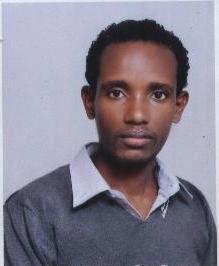 Bisrat said since the day he experienced the violence he has been under surveillance. “Few days ago, I saw them following me behind”, he explained adding “I know they are watching me very closely.”
Bisrat said since the day he experienced the violence he has been under surveillance. “Few days ago, I saw them following me behind”, he explained adding “I know they are watching me very closely.”
But, in the face of such grave threats, Bisrat, a journalist who is committed to freedom of speech, has continued doing his job with courage. He continues writing about the political crisis, poor governance, and human right violation worsening in Ethiopia.
“I don’t have a choice. I am a journalist. There is nothing to do except writing what I see, hear, and feel.” Bisrat explained. He again and again made clear that no threats and tortures would make him stop writing
The paper Tigers
Article 19 of the Universal Declaration of Human Rights, guarantees the right to freedom of expression saying that: “Everyone has the right to freedom of opinion and expression; this right includes freedom to hold opinions without interference and to seek, receive and impart information and ideas through any media regardless of frontiers. Likewise, the International Covenant on Civil and Political Rights (ICCPR), which Ethiopia ratified in 1993, and the African Charter on Human and Peoples’ Rights guarantee the right in a very clear way. They even impose formal legal obligations on state parties to insure this fundamental right is protected.
But, sadly, even in the presence of all these legal documents, Enjoyment of press freedom and freedom of expression still continue to be a far cry for Ethiopian journalists and bloggers as they experience violence while doing their job. They are harassed, threatened, humiliated, and arbitrary jailed.



